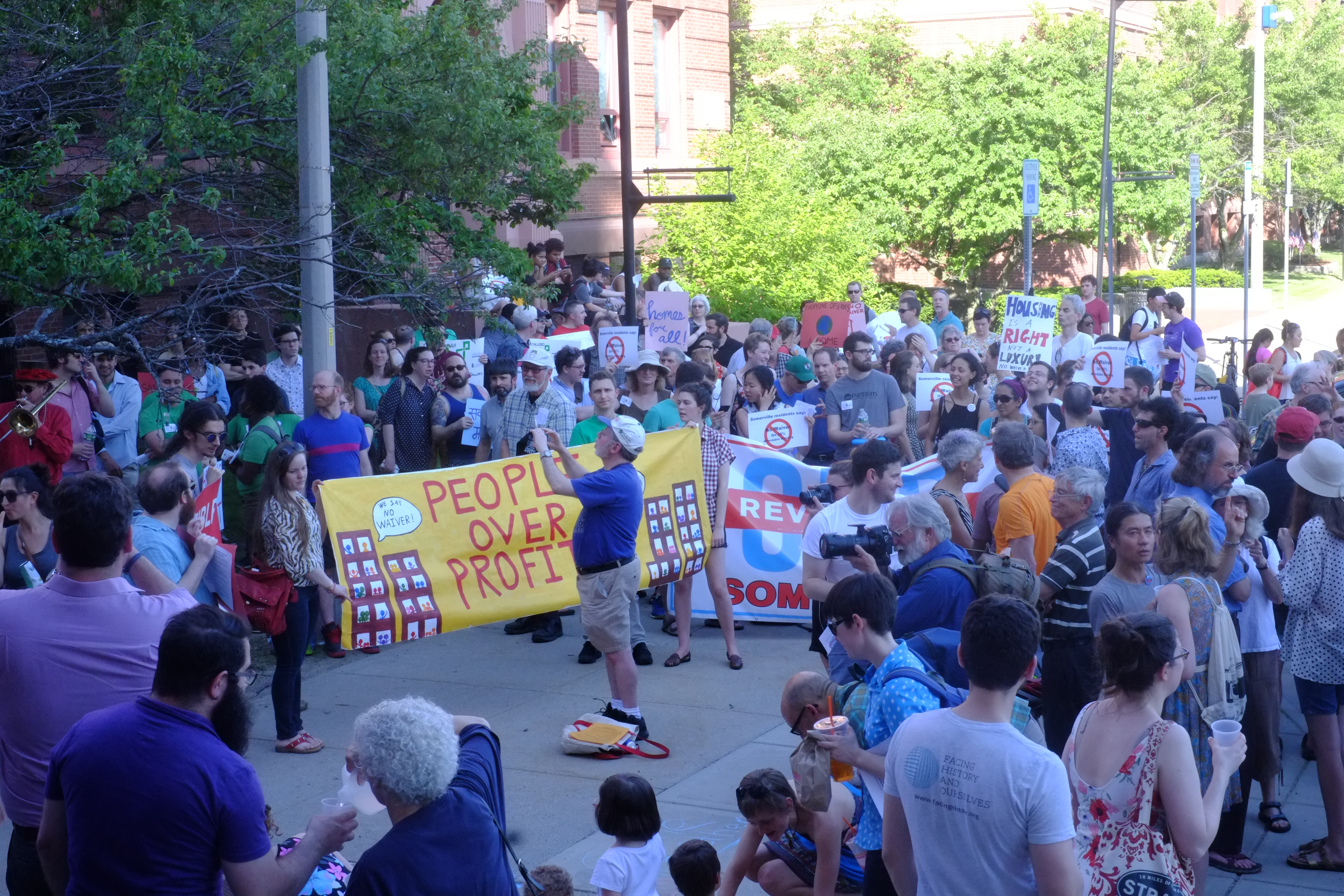The Somerville Planning Board voted 5-1 to grant the developers of Assembly Row a waiver that allows them to make fewer than 20 percent of residential units in the development affordable as mandated by the Somerville Zoning Ordinance’s “inclusionary housing” rules.
Currently there are a total of 1,017 units at Assembly Row, with 890 market rate apartments, and 127 affordable units.
The developer, Federal Realty Investment Trust (FRIT), started the project in 2006, and argue that they shouldn’t be subject to the 20 percent affordable housing bylaw passed in 2016. George Proakis, Director of Planning, presented the board with a “hybrid” plan that would allow the developers to ensure that 16 percent of the on-site units are affordable, and an additional 49 affordable off-site units will be built.
A rally was held before the meeting by demonstrators who urged the board to vote down the request for a waiver.
Andy Klatt, a member of Our Revolution Somerville said before the meeting that he thinks the required amount of affordable housing units built by developers should exceed 20 percent.
“I think we have a housing crisis in Somerville, an affordability crisis,” said Klatt. “It really has to do with the minimum wage, the fair share tax, and the affordability of housing, and we have contractors coming into the city that should be held to the 20 percent…In fact I think it should be a much higher -much higher percentage that’s affordable. Maybe 100 percent. Or 80, or 60.
Klatt acknowledged that construction of the development began long before the 20 percent affordability ordinance went into effect, but he says the developers have the money to meet the 20 percent rule, and housing needs in Somerville demand it. “Times have changed, the crisis is more acute now, and if they want to be responsible and good citizens they should adhere to the current ordinance and not try to milk us and take our city away from us,” Klatt said.
Twenty-year-old Stephanie Santiago said she has lived in Somerville for 18 years. Her parents moved from the Dominican Republic to New York, before coming to the Boston area for the educational opportunities it would provide for she and her siblings.
“In many ways when i was a little girl, I had wished things around me would change. And now that the change is actually happening, all I can feel is sadness,” Santiago said, adding that she believes long time Somerville residents ought to be prioritized over people who come to Somerville because they have money to throw down in a freshly gentrified city.
“When I walk down the street i see major changes and new developments at every turn,” Santiago went on. “But many of those developments are hard for those who live in Somerville, and who have made Somerville an amazing place to live in. Many of my friends have had to leave this city and move to other cities even though they lived here and grew up here their whole lives.”
The crowd in the Aldermen’s Chambers overflowed into the hallway. Hisses and occasionally applause came from various corners of the room as the board debated.
“You guys have these values that are competing against each other, both of which have a valid basis,” Proakis said to the board, adding that changing the required amount of affordable housing in the development from 12.5 percent to 20 percent “creates a series of problems for [FRIT] that aren’t solvable.” He added that FRIT has said it will not continue building if it’s not granted the waiver.
Planning Board member Michael Capuano – the only dissenting vote – said that while FRIT has to answer to its shareholders “I’m under no such obligation,” and he pointed out that the most inexpensive one-bedroom apartment at Assembly Row is $2,725. “To me that’s insane,” Capuano said. “My heart is not breaking for you…I almost feel like this is a subsidy for rich people’s rent.”
Capuano also pointed out that there aren’t any concrete plans for the off-site units: “We’re saying we’re going to take these affordable units and put them elsewhere. Eventually.”
Board member Dorothy Kelly Gay said that while the hybrid plan is not ideal, it’s better than losing the project entirely. “You can’t have everything in life, and half a loaf is better than no bread.”
Board member Rebecca Lyn Cooper said that the city also has a duty to honor its commitment to FRIT, not just for the sake of the Assembly Row development, but so as not to scare off developers in the future who might get the impression that the city doesn’t honor its commitments. “We owe it to ourselves and to other developers to act in good faith.”
The debate was punctuated alternately by applause, boos, hisses, and after the vote, chants of “shame” as the crowd flowed out of city hall to the parking lot.
Benny Wheat of Union United said that while the Board wasn’t obligated to reopen public comment, it seems like the proper thing to do in light of the fact that a new plan was presented and approved.
“The compromise came out a couple of days ago from what I understand…you bring a new proposal, a significantly different proposal like this compromise is not the same thing, and yet they vote on it with public comment. That shows what they think of the public’s opinion,” Wheat said, adding that it wasn’t a surprise. “I was kind of expecting it.”

Leave a Reply
You must be logged in to post a comment.